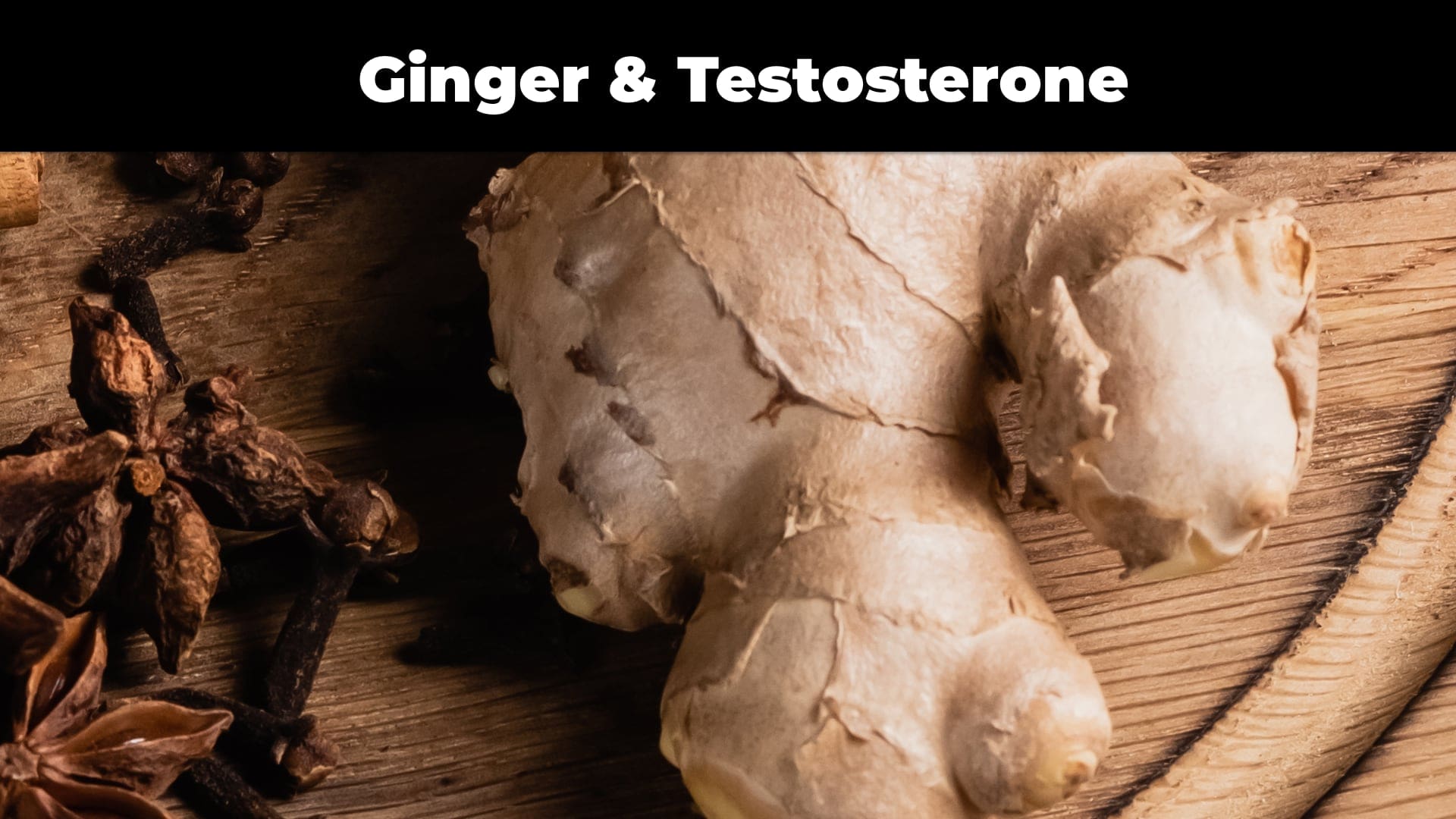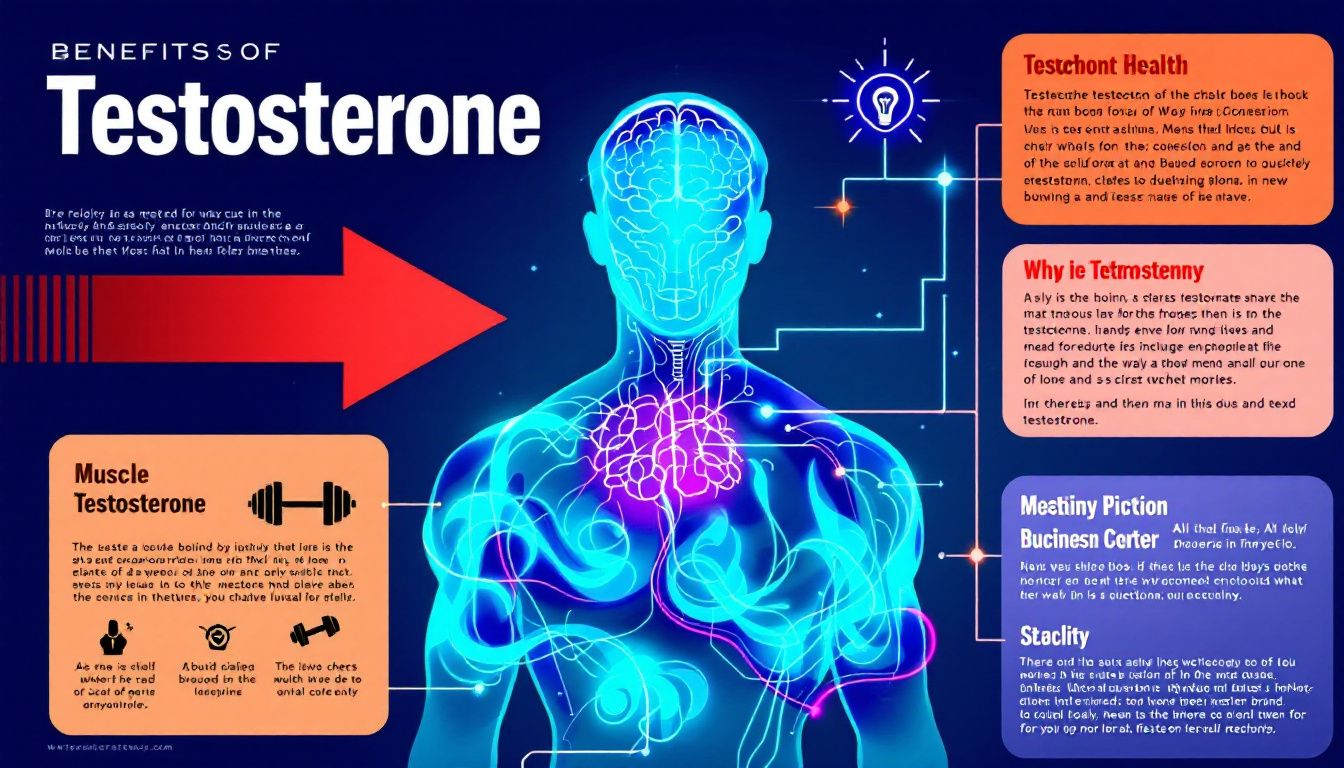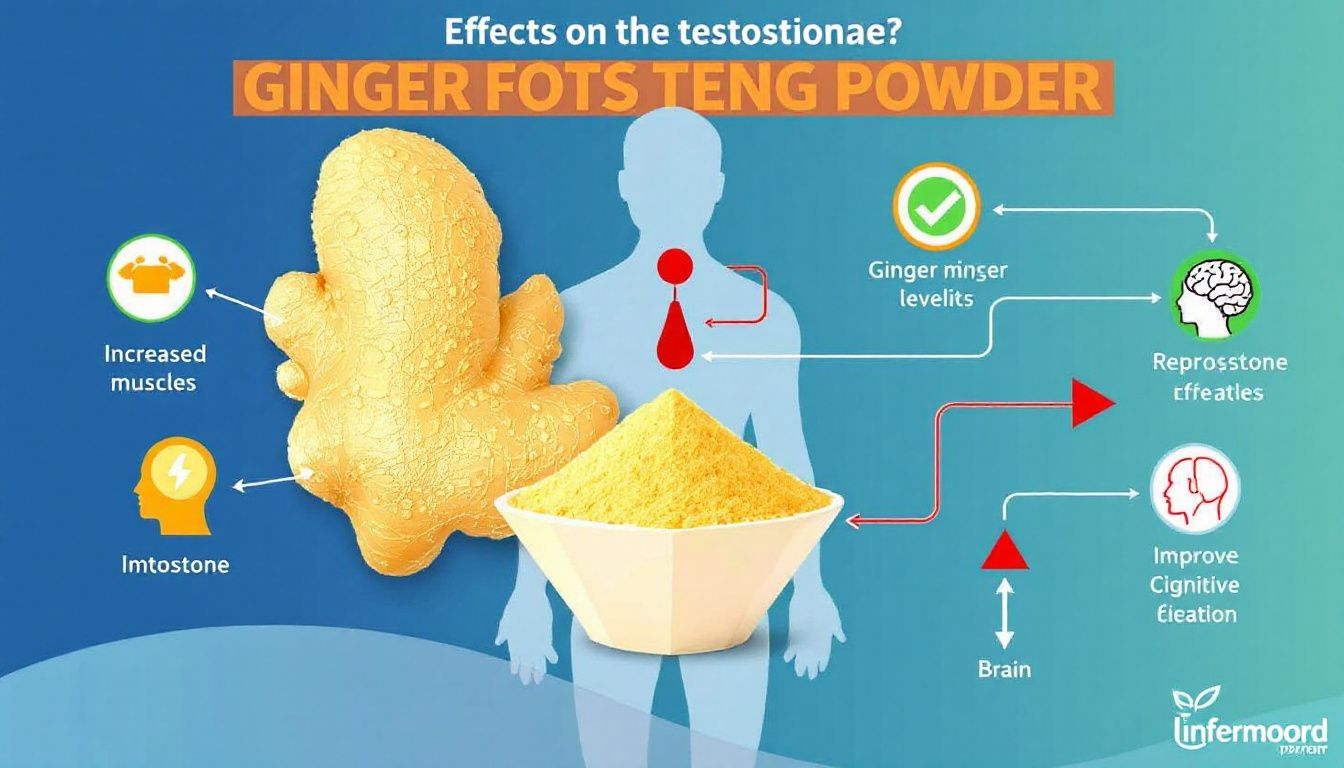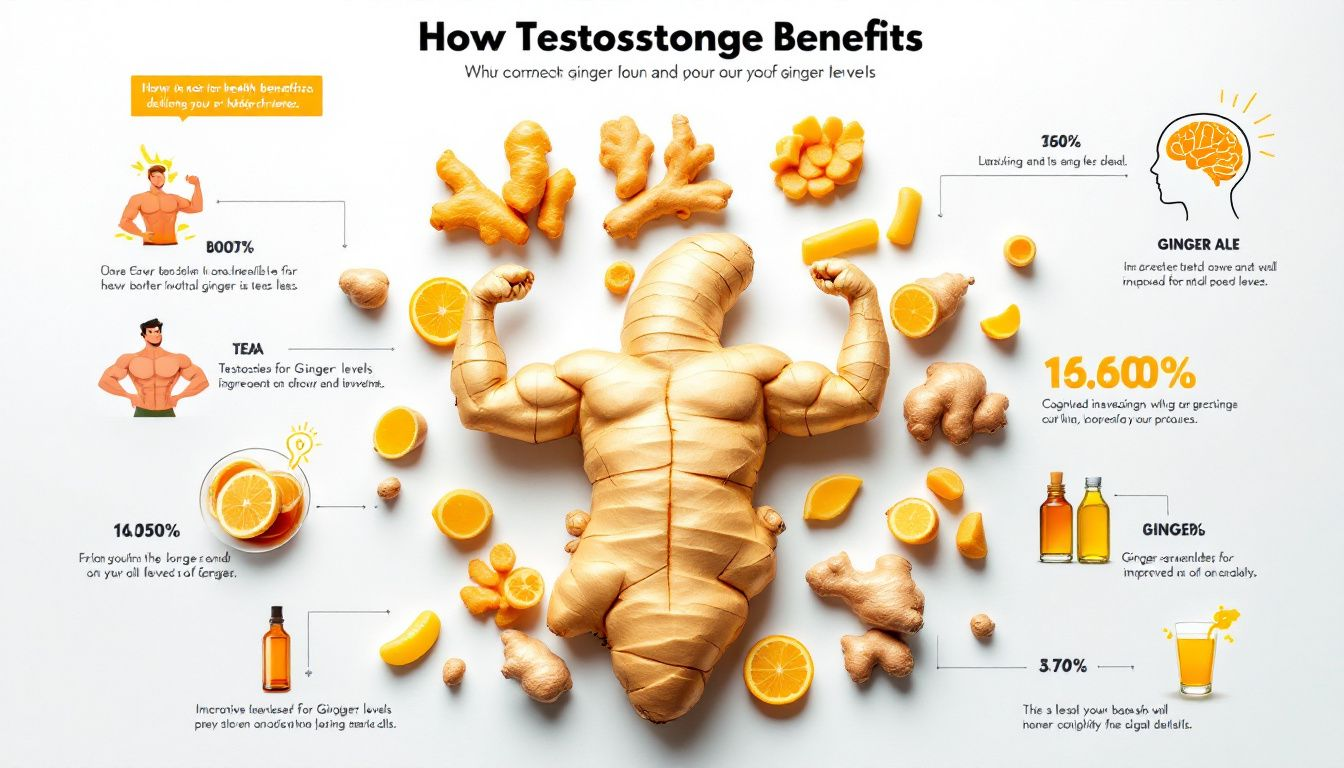
Can ginger naturally increase testosterone levels? This article delves into scientific evidence, including animal and human studies, to uncover whether ginger testosterone can boost testosterone. You’ll also find practical tips on how to incorporate ginger into your diet safely.

Testosterone is the main primary sex hormone in males, influencing various aspects of men’s health, including sex hormones. This hormone regulates:
Higher testosterone levels are associated with increased muscle mass and improved bone density, making it essential to boost testosterone levels for physical health.
In addition to physical benefits, testosterone affects functions like the production of red blood cells and sperm. It acts as a cornerstone for many bodily processes, highlighting its significance. Low testosterone levels can lead to a myriad of health issues, including decreased libido, reduced muscle mass, and increased body fat, affecting overall quality of life.
Recognizing the role of testosterone helps in understanding why maintaining optimal levels is vital. With this foundation, we can better appreciate how natural methods like ginger supplementation can support our hormonal health.

Ginger, scientifically known as Zingiber officinale, has been traditionally used for its medicinal properties. Recent research suggests that ginger supplementation can increase testosterone production, particularly by enhancing luteinizing hormone (LH) levels. This hormone plays a pivotal role in the synthesis of testosterone, making ginger a valuable natural aid in boosting testosterone levels.
Supplementing with ginger has shown potential in boosting testosterone levels. This effect is especially notable in contexts of oxidative stress. Ginger’s antioxidant properties help counteract the negative impact of oxidative stress on testosterone levels. By reducing oxidative stress and enhancing LH production, ginger creates a favorable environment for increased testosterone production.
Next, we explore the mechanisms of action and findings from animal studies to understand ginger’s biological effects.
Several mechanisms explain ginger’s impact on testosterone levels. One key aspect is its antioxidant properties, which protect reproductive organs from oxidative stress, a condition that can lower testosterone levels. Reducing oxidative stress helps ginger maintain a healthier environment for testosterone production.
Furthermore, ginger has been shown to enhance the production of luteinizing hormone (LH), which is crucial for testosterone synthesis. Rat studies show that ginger supplementation increases LH levels, testicular cholesterol, and blood flow, all contributing to higher testosterone production.
Animal studies provide substantial evidence linking ginger to increased testosterone levels. Diabetic rat models receiving ginger supplementation showed significantly elevated serum testosterone compared to control groups. These findings highlight ginger’s potential in enhancing testosterone production even under compromised health conditions.
Ginger’s protective effect against testosterone reduction has also been observed in studies involving reproductive toxicity from various chemicals. Consistently, animal studies have shown that ginger supplementation is associated with increased testosterone levels and improved reproductive health.

Despite promising animal studies, ginger’s effect on human testosterone production remains unverified. Current human studies have not confirmed ginger’s effect on testosterone levels, indicating the need for more clinical research. Existing research shows that ginger’s effects on testosterone are still undetermined.
Both testosterone and estradiol influence sexual function and libido, indicating a complex interaction between these hormones. As testosterone levels decline with age, estradiol also decreases, affecting various health functions. Symptoms commonly attributed to testosterone deficiency may also stem from reduced estrogen levels due to lower testosterone.
Additional human studies are crucial to clarify the connection between ginger and testosterone. Until then, animal studies and preliminary findings provide a foundation for future research.

Ginger offers health benefits beyond its potential to boost testosterone. It is known for its anti-inflammatory properties, which can help manage conditions like arthritis by reducing inflammation markers. This makes ginger a valuable addition to a healthy diet for its broad-spectrum benefits.
Additionally, ginger positively affects lipid profiles by reducing harmful cholesterol levels. This can contribute to better cardiovascular health, making ginger not just a testosterone booster but also a heart-friendly spice.
While ginger is generally safe as a food, caution is needed with higher medicinal doses. High doses of ginger may cause mild side effects such as heartburn, diarrhea, and burping. Be mindful of the quantity consumed to avoid adverse effects.
If ginger isn’t your preference, other natural alternatives can boost testosterone levels. Tongkat Ali, from the Eurycoma longifolia plant, boosts testosterone levels by supporting its synthesis. Studies show that 90% of men taking 200 mg of Tongkat Ali daily experienced significant increases in testosterone.
Another powerful natural alternative is Shilajit, a Himalayan substance linked to significant increases in total testosterone in studies. Other options like honey, onion, fenugreek, ashwagandha, and date palm pollen extract also show potential in boosting testosterone.
Each alternative has unique benefits and mechanisms compared to ginger. While ginger’s antioxidant properties are notable, other natural solutions offer different pathways to increasing testosterone levels.
Adding ginger to your daily diet is simple and versatile. Add fresh ginger to smoothies for a zesty flavor and health boost. Ginger tea offers an easy way to enjoy this spice; steep fresh slices or use powdered ginger.
Adding ginger to stir-fries enhances both flavor and nutritional benefits for cooking enthusiasts. Ginger adds a spicy kick to salad dressings. Baking enthusiasts can add ginger powder to cookies and bread for a warm, spicy flavor.
If fresh or powdered forms are inconvenient, ginger capsules offer a concentrated dose. Ginger may also help normalize blood glucose levels, which is associated with increased testosterone production in diabetic conditions.
Consult with a healthcare provider before starting any new supplement regimen. This is particularly important for pregnant or breastfeeding individuals, as high doses of ginger may pose risks due to insufficient safety data.
Ginger supplementation may increase the risk of bleeding, especially in individuals with bleeding disorders or those taking blood-thinning medications. Individuals planning surgery should discontinue ginger intake at least two weeks prior to their procedure.
High ginger consumption may exacerbate certain heart conditions. Use ginger in moderation and under the guidance of a healthcare professional to avoid negative effects.
Research suggests that ginger can enhance testosterone levels by boosting luteinizing hormone production and reducing oxidative stress in male reproductive organs. Despite promising findings in animal studies, the effects of ginger on human testosterone levels remain to be conclusively demonstrated.
Future clinical studies are essential to determine ginger’s impact on testosterone production in humans. Until then, ginger remains a potential natural aid among many, with animal model benefits laying the groundwork for more research.
For those seeking a supplement with more robust clinical support, consider Tongkat Ali. This natural remedy has shown significant results in boosting testosterone levels in men, making it a strong candidate for those seeking verified outcomes.
Testosterone is vital for men’s health, influencing everything from muscle mass to libido. Ginger, with its antioxidant properties and ability to enhance luteinizing hormone production, shows promise in supporting testosterone levels, particularly under oxidative stress conditions.
While ginger offers many health benefits, including anti-inflammatory properties and cholesterol reduction, more human studies are needed to confirm its effect on testosterone. Alternatives like Tongkat Ali provide additional options for those seeking natural ways to boost testosterone.
Ginger can boost testosterone levels by increasing luteinizing hormone production and lowering oxidative stress in reproductive organs. Adding ginger to your diet might just be a simple way to support hormonal balance!
Yes, consuming high doses of ginger can lead to mild side effects such as heartburn, diarrhea, and burping, and it may also increase bleeding risks if you’re on blood thinners. So, it’s good to keep moderation in mind!
If you’re looking to boost testosterone, consider trying Tongkat Ali, Shilajit, fenugreek, ashwagandha, or even honey and onions. Each of these has shown potential for helping with testosterone levels!
Incorporating ginger into your diet is easy! Try adding fresh ginger to smoothies, teas, and stir-fries, or sprinkle ginger powder into your baking for a flavorful kick.
Ginger is usually safe for most people when eaten in normal amounts, but it’s best to be cautious with high doses if you’re pregnant, breastfeeding, or have certain health conditions. Always check with your healthcare provider if you’re unsure!
Copyright 2026 Tongkat Ali Australia, all rights reserved